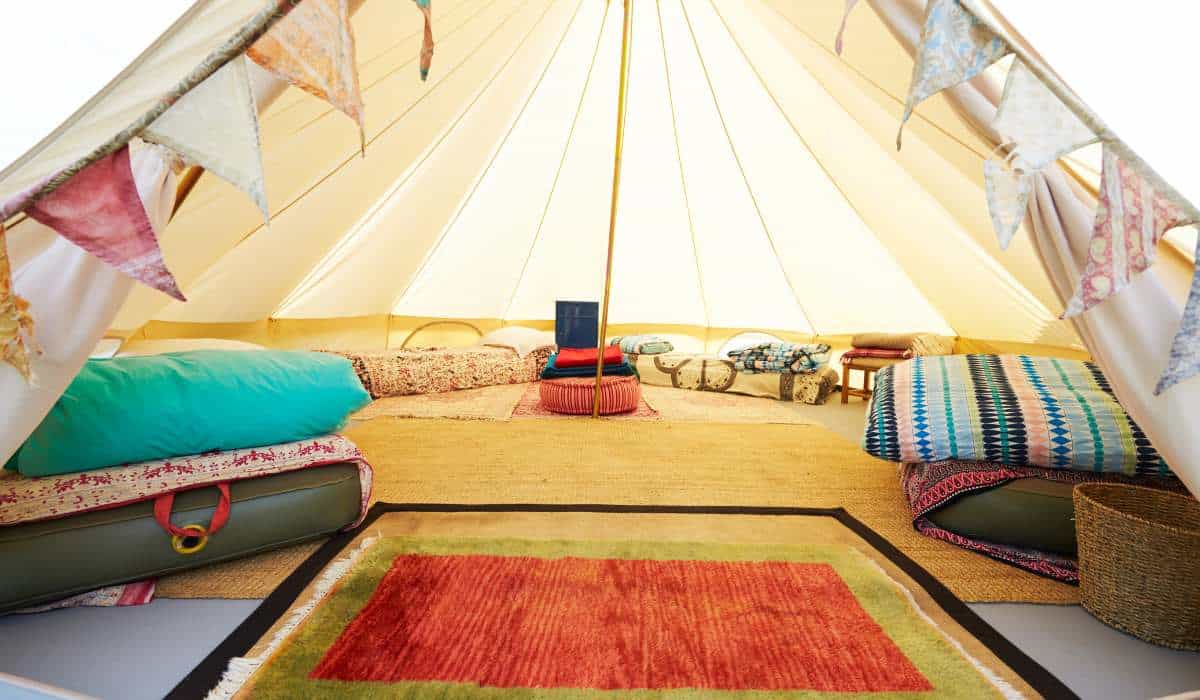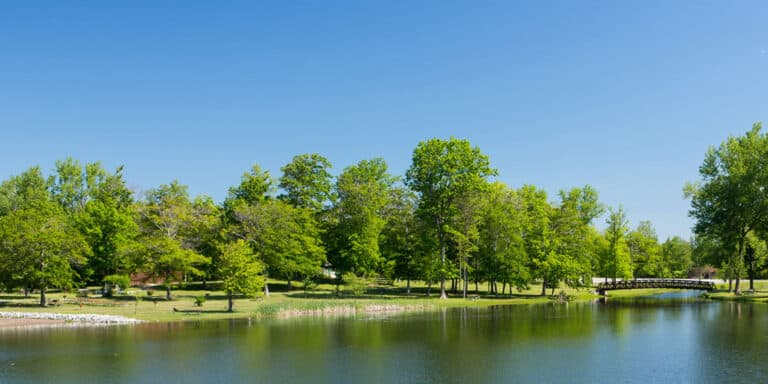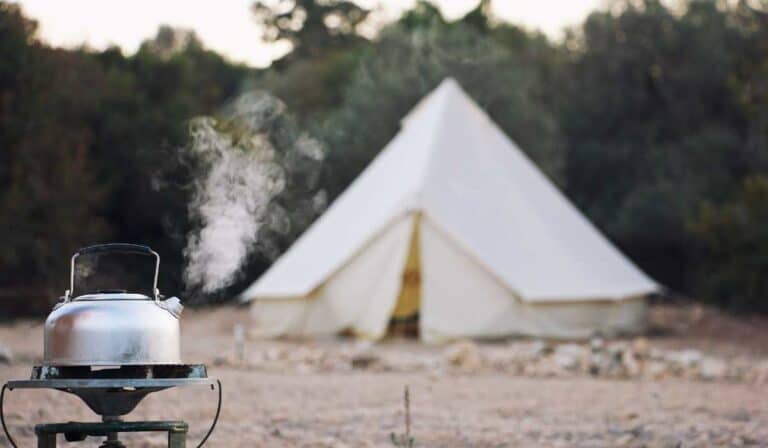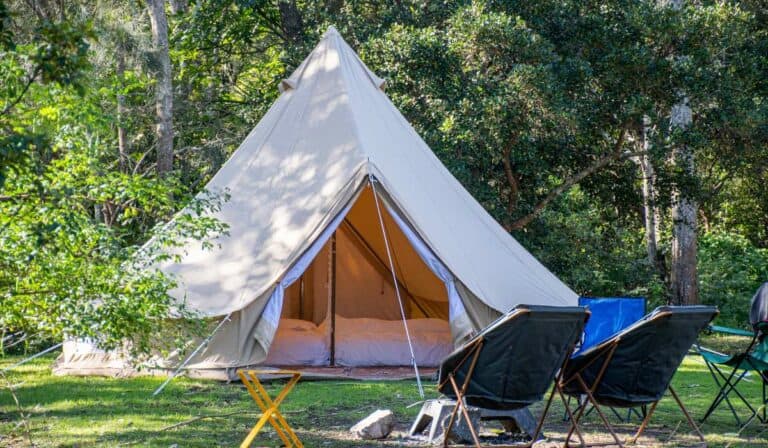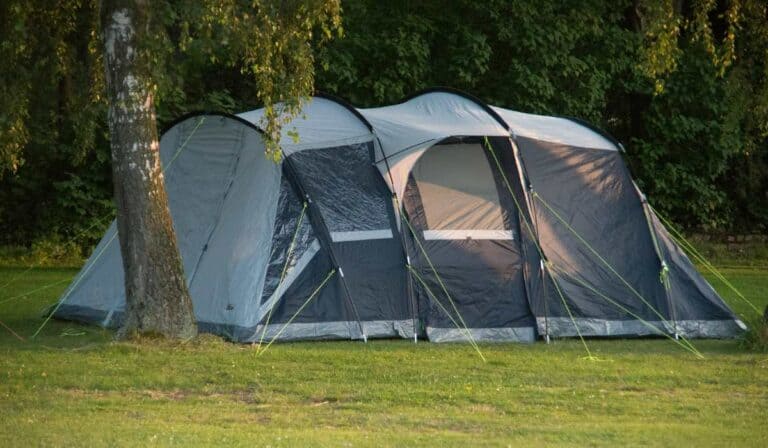Using Airbnb for Tent Camping
Using Airbnb for tent camping has revolutionized the way we explore and experience our beautiful planet. As more people seek unique and immersive travel experiences, platforms like Airbnb have expanded to offer alternative accommodations beyond traditional hotels or vacation rentals.
In this blog post, you’ll discover how the rise of “Airbnb for Campsites” platforms such as Hipcamp is making it easier than ever to find the perfect campsite with just a few clicks. We’ll also delve into creative accommodations that go beyond your standard canvas tent, including glamping tents in Hawaii Volcanoes National Park and unconventional guest spaces like treehouses and houseboats.
Furthermore, we will discuss the importance of honesty when listing your space on these platforms – accurate descriptions are key to preventing negative reviews and ensuring guests have an enjoyable stay. You’ll be inspired by success stories from unconventional listings that rake in impressive earnings while contributing to sustainable tourism practices through eco-friendly accommodations and supporting local economies.
Last but not least, we will touch upon essential rules & regulations before renting out spaces on Airbnb or similar sites – understanding zoning laws, and restrictions, and acquiring necessary permits or licenses is crucial for both hosts and guests alike. So let’s dive into using Airbnb for tent camping like never before!
Table of Contents
1. Exploring Unique Tent Camping Options

Discover the growing trend of using Airbnb and other platforms like Hipcamp for tent camping, offering travelers unique experiences in off-the-beaten-path destinations. With over 300,000 campsites listed on Hipcamp alone, campers can find a variety of options to suit their preferences.
The rise of “Airbnb for Campsites” platforms such as Hipcamp
Gone are the days when your only option was booking a traditional campground or pitching your tent at an overcrowded national park. Now you can explore unique camping opportunities through Airbnb-style websites that cater specifically to outdoor enthusiasts. These platforms allow property owners to list their land for campers seeking more secluded and personalized experiences.
Filtering options for finding the perfect campsite
Finding the ideal spot has never been easier with advanced filtering options available on these websites. You can search based on location, amenities (like access to water or electricity), pet-friendliness, price range, and even specific activities such as fishing or hiking trails nearby. This makes it easy to customize your camping experience based on what you prefer and enjoy.
- Airbnb: Although not exclusively focused on camping accommodations, Airbnb does offer some unique listings under its “Nature Lodges” and “Unique Stays” categories.
- Hipcamp: As a dedicated platform for camping, Hipcamp offers an extensive range of options from traditional tent sites to glamping experiences. Their advanced search filters make it easy to find the perfect spot based on your preferences. Check out their website at Hipcamp
So why not embark on a new adventure by exploring these unique tent camping options available through Airbnb and similar platforms? You might just discover your next favorite outdoor getaway.
Click here to read about Best Portable Air Conditioners for Camping: Ultimate Guide
2. Honesty is Key When Listing Your Space
When it comes to listing your tent camping space on platforms like Airbnb or Hipcamp, honesty truly is the best policy. By providing accurate descriptions and information about necessary amenities, you can ensure that guests have realistic expectations for their stay and avoid any potential misunderstandings.
Accurate Descriptions Prevent Negative Reviews
An honest and detailed description of your campsite will help set the right expectations for potential guests. Provide potential guests with details regarding the size, accessibility, attractions in the vicinity, and any unique characteristics that make your campsite distinctive. Mentioning any regulations or restrictions that apply (e.g., no open fires) is key to ensuring a positive experience for all guests. Being transparent with this information will not only attract more suitable guests but also prevent negative reviews stemming from unmet expectations.
Necessary Amenities Based on Location Requirements
- Insect Repellent: If your campsite is located in an area prone to insects such as mosquitoes or ticks, provide insect repellent for guest use. This small gesture goes a long way in ensuring a comfortable experience.
- Torches: Campsites often lack proper lighting at night; therefore, offering torches or lanterns helps guests navigate safely after dark.
- Clean Water Source: Ensure access to clean water for drinking and cooking purposes by either providing bottled water or sharing details about nearby sources such as streams or wells.
- Toilet Facilities: Clearly state whether you have on-site toilet facilities or if guests need to use a nearby public restroom.
By being honest and transparent in your listing, you can attract the right kind of guests who will appreciate your unique camping space. Additionally, competitive pricing based on similar listings in the area helps ensure that you provide value for money while still making a profit from renting out your space. If you’re offering a canvas tent or glamping tent, make sure to mention it in your description. Also, don’t forget to provide information about sleeping bags if they are not included in the rental.
3. Success Stories from Unconventional Listings

There is no shortage of inspiring stories where hosts have transformed their quirky spaces into profitable ventures by renting them out through Airbnb or similar services. These unconventional listings attract adventurous travelers seeking unique experiences and, in turn, provide a lucrative income for the hosts.
Kehau Hall’s $28k per year Glamping Tent Rental in Hawaii
Kehau Hall, an enterprising host from Hawaii, turned her love for glamping into a successful business venture. She rents out a luxurious canvas tent on her property near Volcanoes National Park to guests looking for an immersive experience amidst nature. With amenities like comfortable beds, electricity, and Wi-Fi access – all while being surrounded by lush greenery – Kehau has managed to earn over $28k annually.
John Potter’s Backyard Tent Listing Earning $31 per Night
In another example of creative thinking and resourcefulness, John Potter decided to list his backyard as a camping spot on Airbnb. Located just outside Denver city limits with easy access to hiking trails and other outdoor activities nearby, John provides campers with everything they need: tents set up upon arrival (or space to pitch their own), portable toilets stocked with toiletries, fire pits equipped with cooking grates and utensils – all at just $31 per night. This innovative idea has not only generated extra income for John but also provided an affordable and unique lodging option for travelers.
These success stories prove that unconventional listings can be a win-win situation for both hosts and guests. So, if you have some unused space or a creative idea to offer memorable stays, why not give it a try? You might just find yourself with a profitable side gig while providing unforgettable experiences to adventure-seeking travelers.
Key Thought:
Unconventional Airbnb listings can be a profitable venture for hosts and offer unique experiences to adventurous travelers. Examples include Kehau Hall’s glamping tent rental in Hawaii earning over $28k annually, and John Potter’s backyard camping spot near Denver generating extra income at just $31 per night. With creative thinking and resourcefulness, unused space or quirky ideas can turn into successful side gigs.
Click here to read about Camping Near San Francisco: Top Spots and Essential Tips
4. Rules & Regulations Before Renting Out Spaces
Prior to embarking on the journey of renting out your property for tent camping, it is essential to familiarize yourself with local laws and regulations. Ensuring compliance with the law helps avoid potential issues down the line and creates a safe environment for both hosts and guests.
Understanding Zoning Laws and Restrictions
Zoning laws vary by location, so it’s essential to research what is allowed in your area before listing your space on platforms like Airbnb or Hipcamp. Some areas may have restrictions on how many people can stay overnight, while others might require specific permits or licenses. To uncover zoning regulations in your vicinity, look up your local government’s site or talk to a lawyer who specializes in land use law.
Acquiring Necessary Permits or Licenses
If you discover that you need permits or licenses to rent out spaces for tent camping, don’t fret. Many jurisdictions offer simple processes for obtaining these documents. Start by contacting your local permitting office to inquire about any necessary applications and fees. Be prepared to provide details about the size of your property, the number of guests you plan to accommodate, parking availability, restroom facilities (if applicable), etc.
- Action Item: Research zoning laws in your area through official government websites such as USA.gov Local Governments Directory.
- Action Item: Consult with a legal professional if needed – they can help navigate complex regulations efficiently.
- Action Item: Obtain required permits/licenses promptly after confirming the need for them to avoid potential fines or penalties.
By taking these steps, you’ll be well on your way to creating a unique and enjoyable tent camping experience for guests while staying within the bounds of local regulations. Happy hosting.
5. Contributing to Sustainable Tourism Practices

Embracing the trend of using Airbnb for tent camping not only provides personal financial gain but also contributes positively towards sustainable tourism practices. Encouraging long-term thinking through connecting people with nature promotes responsible travel choices.
Promoting Eco-Friendly Accommodations
One significant benefit of opting for tent camping on platforms like Airbnb and Hipcamp is that it promotes eco-friendly accommodations. By choosing a low-impact, environmentally conscious lodging option, travelers can minimize their carbon footprint while enjoying unique experiences in off-the-beaten-path destinations. For instance, some hosts offer solar-powered facilities or use composting toilets to reduce waste generation.
Supporting Local Economies Through Alternative Lodging Options
Beyond environmental benefits, using Airbnb for tent camping helps support local economies by providing an additional income stream for property owners who may otherwise struggle financially. Guests’ expenditures on food, activities, and other amenities during their stay can directly benefit the local community. This approach aligns with the principles of sustainable tourism, which aims at balancing economic growth with preserving natural resources and cultural heritage.
- Eco-tips:
- Pack reusable items such as water bottles and cutlery instead of single-use plastics.
- Select campsites near public transportation options to minimize vehicle emissions.
- Familiarize yourself with Leave No Trace principles before embarking on your adventure.
Opt for Airbnb tent camping to both enjoy the great outdoors and promote sustainable tourism. So why not give it a try? Explore unique accommodations, connect with nature, and contribute to responsible travel choices.
Click here to read about Camping Rugs: Choosing the Right Rug for Different Camping Needs
FAQs about Using Airbnb for Tent Camping
Can I List a Tent on Airbnb?
Yes, you can list a tent on Airbnb as long as it meets the platform’s basic requirements. Ensure that your listing accurately describes the space and amenities provided. It is essential to comply with local zoning laws and acquire necessary permits or licenses before listing.
What Is the Difference Between Hipcamp and Tentrr?
Hipcamp is an online marketplace for booking campsites, while Tentrr offers pre-set-up canvas tents at private campgrounds. Hipcamp features various types of accommodations like RV parks, public lands, and glamping tents. On the other hand, Tentrr focuses primarily on providing fully-equipped camping experiences in unique locations.
Is There an App Like Airbnb for Camping?
Hipcamp, often referred to as “Airbnb for Campsites,” is an app that allows users to discover and book unique outdoor stays such as tent camping spots, cabins, treehouses, and glamping tents, similar to how Airbnb operates for traditional lodging options.
Do People Use Hipcamp?
Absolutely. Many travelers prefer using Hipcamp due to its extensive range of unconventional accommodation options across thousands of locations in North America. The platform has gained popularity among those seeking unique outdoor experiences beyond typical hotels or vacation rentals.
Conclusion
In conclusion, using Airbnb for tent camping can be a great way to explore unique and creative accommodations beyond traditional tents. Platforms like Hipcamp offer filtering options to help find the perfect campsite, while honest listings with accurate descriptions prevent negative reviews. Success stories from unconventional listings show that renting out spaces can be lucrative, but it’s important to understand rules and regulations before doing so. Contributing to sustainable tourism practices by promoting eco-friendly accommodations and supporting local economies through alternative lodging options is also crucial.

